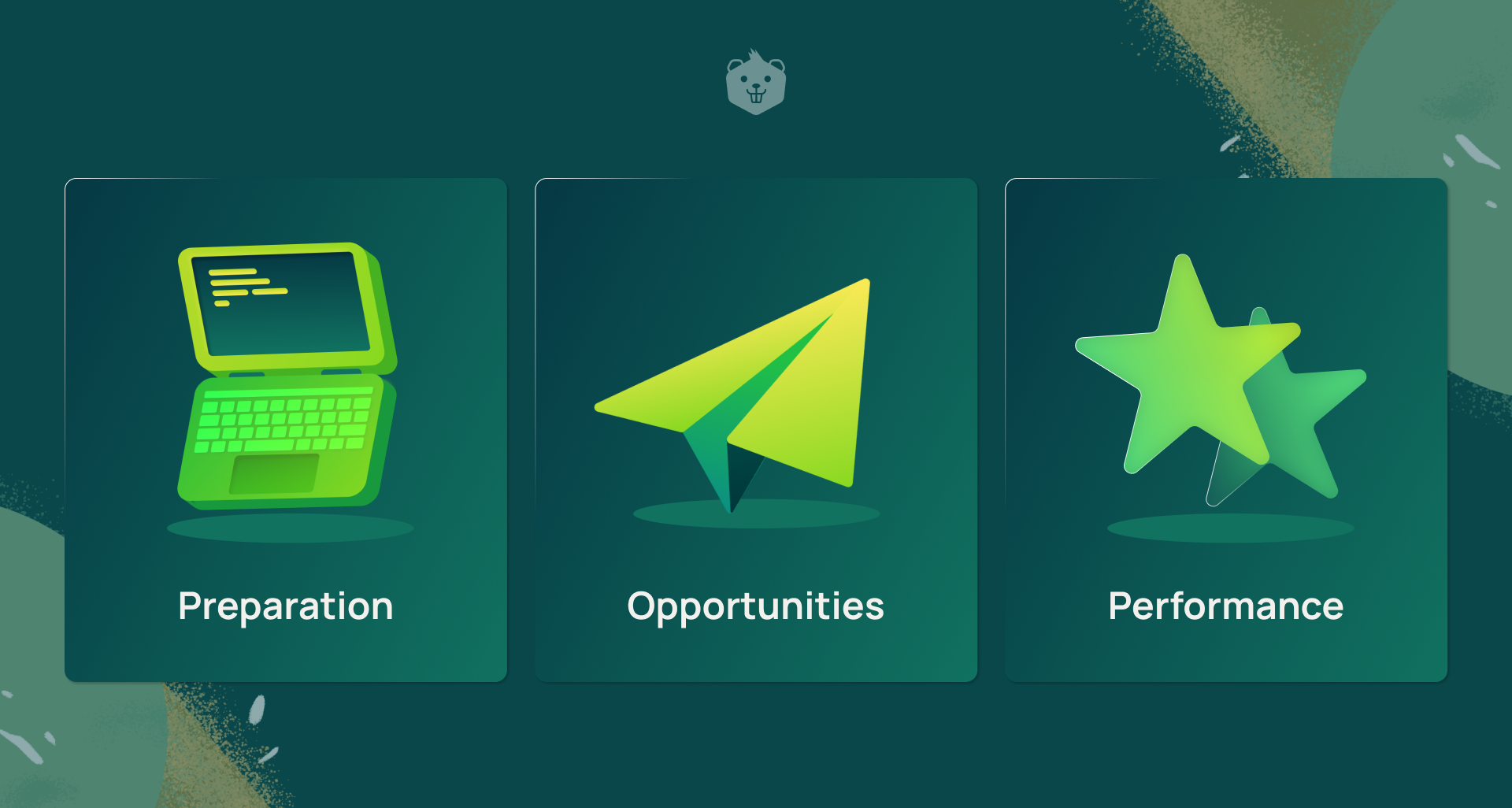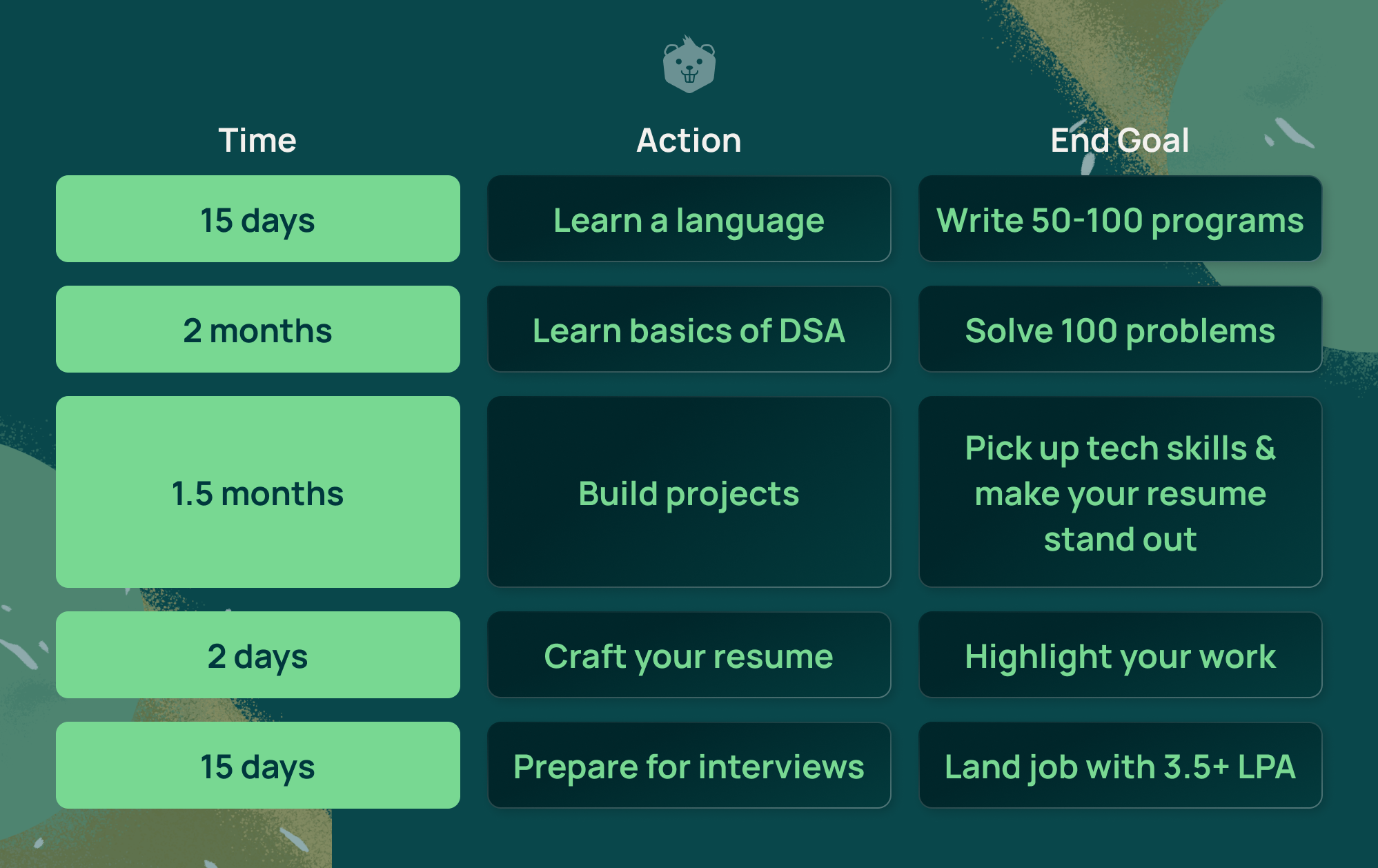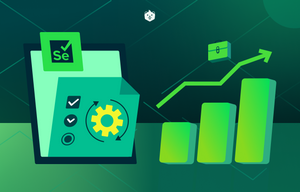Finding and bagging your first job in the software industry can be a matter of great pride. A lot of work goes into applying to various job applications. You’ll have to prepare good resumes, crack aptitude tests, technical interviews, go through HR rounds, and so on.
This process of applying for entry-level jobs remains roughly the same in all software companies.
In this process, you might discover that a lot of companies have certain eligibility criteria to apply for a job and your background doesn’t meet them.
Or you might not be able to apply to certain companies because you are from a college that does not meet their standards.
This does NOT mean you are at a dead end!
This does NOT mean you have no opportunities!
We have a solution that will work, help you understand what you can do in this setback, and show what your job prospects really are like.
Ensure the right mindset
Address the emotions and thoughts you might have during this time. It can be hard to fight these thoughts and emotions. You could be thinking that you should’ve scored better in 12th, focused on academics better in college.
You might have had to miss exams which turned into backlogs due to health issues, or you might have gaps due to misfortunes. The world can start to feel like it’s very unfair.
Take some time, come to terms with all these thoughts, and acknowledge that these are things that you can’t control anymore.
Do not isolate yourself, you need to keep your friends and loves ones closer now.
Understand the reality
The first and foremost thing you need to understand is you are not at a dead end. You can still achieve a great first job. The software industry has opportunities in abundance.
Ingredients for any successful career are

- Preparation - you have to have skills.
- Opportunities - you have to find good opportunities to demonstrate your skills.
- Performance - you have to perform well in the opportunities you get leveraging your skills.
Before deep-diving into the preparation and performance, let’s quickly understand how does your background affect the opportunities you get?
It is not as bad as you think:
If you apply for 10 companies, you may get shortlisted for less than 3 companies instead of 8. That’s it!
Your background does not eliminate all opportunities. It only affects the number of opportunities.
So, how do you improve this?
- Improving resume.
- Apply for more jobs.
Both of these things are doable and under your control.
Talent and skill will play a role
Do not get disheartened that you are not able to bag your dream job. Keep learning and working on your area of interest in computer science. You can still improve your skills in your area of interest by publishing research papers, writing code, and publishing to Github.
What do good computer science students/grads do?
Talent and skill will play a role
Do not get disheartened that you are not able to bag your dream job. Keep learning and working on your area of interest in computer science. You can still improve your skills in your area of interest by publishing research papers, writing code, and publishing to Github.
What do good computer science students/grads do?
- They will have a good hold on at least one programming language.
- They would have learned Data Structures and Algorithms well.
- They solve problems and write good code.
- They work on projects, small and big from time to time and publish them and showcase them on various platforms such as Github.
Adding to this, you can do more! You can publish research papers, write articles for journals, hone your skills by participating in competitive coding, attend workshops.
Try to make time for these things while you prepare yourself for the job hunt. They will add value to your resume and open up many avenues.
A few months of effort is all you need
Actionable 4-5 month plan
You only need a few months of effort to put yourself out there and grab opportunities. So do not look back anymore! It is time to look forward!
Here is a detailed forward-looking plan that you can do in 4-5 months by spending 30-40 hrs per week.
Time Commitment: 30-40 hours per week
Duration: 4-5 months

- Learn a language
Time: 15 days
Learn Python, JavaScript, or Java. Either one of these languages is sufficient.
One of the best resources online to learn a programming language well is freeCodeCamp.
Goal
Write 50-100 line programs in any 1 language you choose.
2. Learn basics of DSA
Time: 2 months
A lot of companies have coding assessments as the first round of interviews as it is one of the easiest ways to filter candidates. So ensure you are reasonably ready for it.
If you don’t how or where to get started with your prep, watch this video to know what you need to learn before your next interview.
Goal
Finish stage 1 from the above video.
3. Build Projects
Time: 1-1.5 months
Build 2-3 projects to improve your resume. Feel free to choose any projects, but avoid Machine Learning and IoT projects that don’t focus much on improving your coding abilities.
Choose projects that require you to write a reasonable amount of code.
It is okay to refer to someone else’s solution, but do not copy it. There’s no learning there.
Head over to Crio Projects Hub to choose from over 50 projects in Python, Java, JavaScript and complete them with a free guided plan.

Goal
Pick up tech skills & make your resume stand out.
4. Craft your resume
Time: 1-2 days
Prepare a good resume adding projects, skills.
Run it by a couple of your friends to get feedback - it shouldn't be more than 1 page; at most 1.5 pages.
Also read: Software Developer Resume Tips - The Ultimate Resume Guide
Goal
Highlight your work.
5. Interview Prep
Time: 15 days
Learn a bit of database. Prepare for common interview questions on it from tutorialspoint or geeks for geeks around database, the language you picked up (javascript or python).
Depending on the job you get shortlisted for, you might have to search and practice company specific interview questions.
Goal
Interview readiness
6. Prepare for interviews
Apply to enough number of companies - tap into your friends’ network/LinkedIn/angel.co/Naukri
You have to apply for at least 25 companies per week
Goal
While applying/attending interviews, keep revising concepts you missed during the interview.
Revise DSA, continue building projects to improve your resume.
Now is the time - make a commitment and change your life forever in the next 4-5 months!
Tips
Here are some additional tips for landing your first software job:
- Focus on your strengths: Identify your areas of expertise and highlight them on your resume. If you're a strong programmer, showcase your coding skills. If you're a good communicator, emphasize your ability to work in teams.
2. Network: Attend industry events, connect with people on LinkedIn, and reach out to professionals in your field. Networking can open doors to opportunities you might not find otherwise.
3. Be persistent: The job search can be challenging, but don't give up. Keep applying, keep learning, and keep refining your skills.
4. Consider a bootcamp: If you're looking to quickly gain the skills you need for a software job, a coding bootcamp can be a great option. Bootcamps provide intensive training in programming languages, data structures, algorithms, and other essential skills.
5. Explore different career paths: The software industry offers a wide range of career paths, from front-end development to back-end development, data science, and cybersecurity. Research different roles and find one that aligns with your interests and skills.
6. Stay up-to-date: The software industry is constantly evolving, so it's important to stay up-to-date on the latest technologies and trends. Read industry blogs, attend conferences, and take online courses to keep your skills sharp.
Remember, landing your first software job is a journey, not a destination. With hard work, dedication, and the right mindset, you can achieve your goals and embark on a successful career in the software industry.











